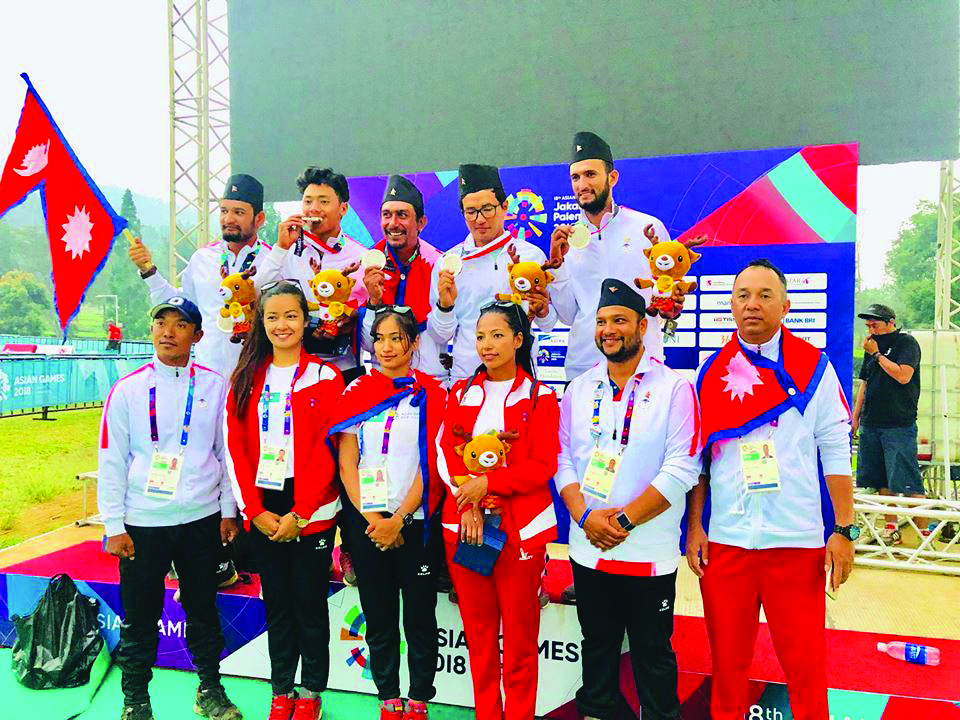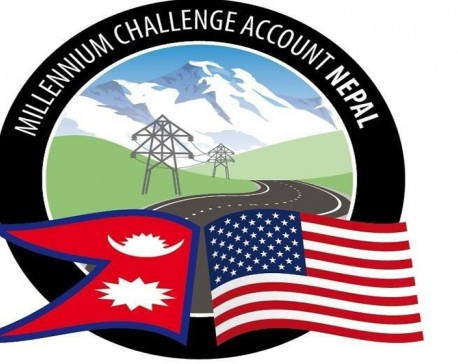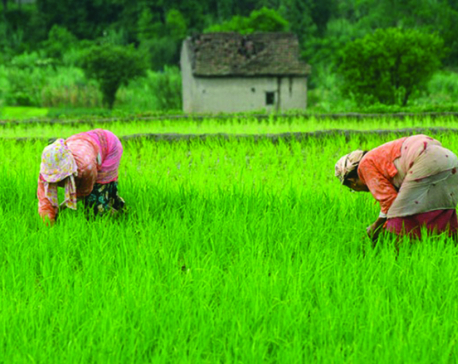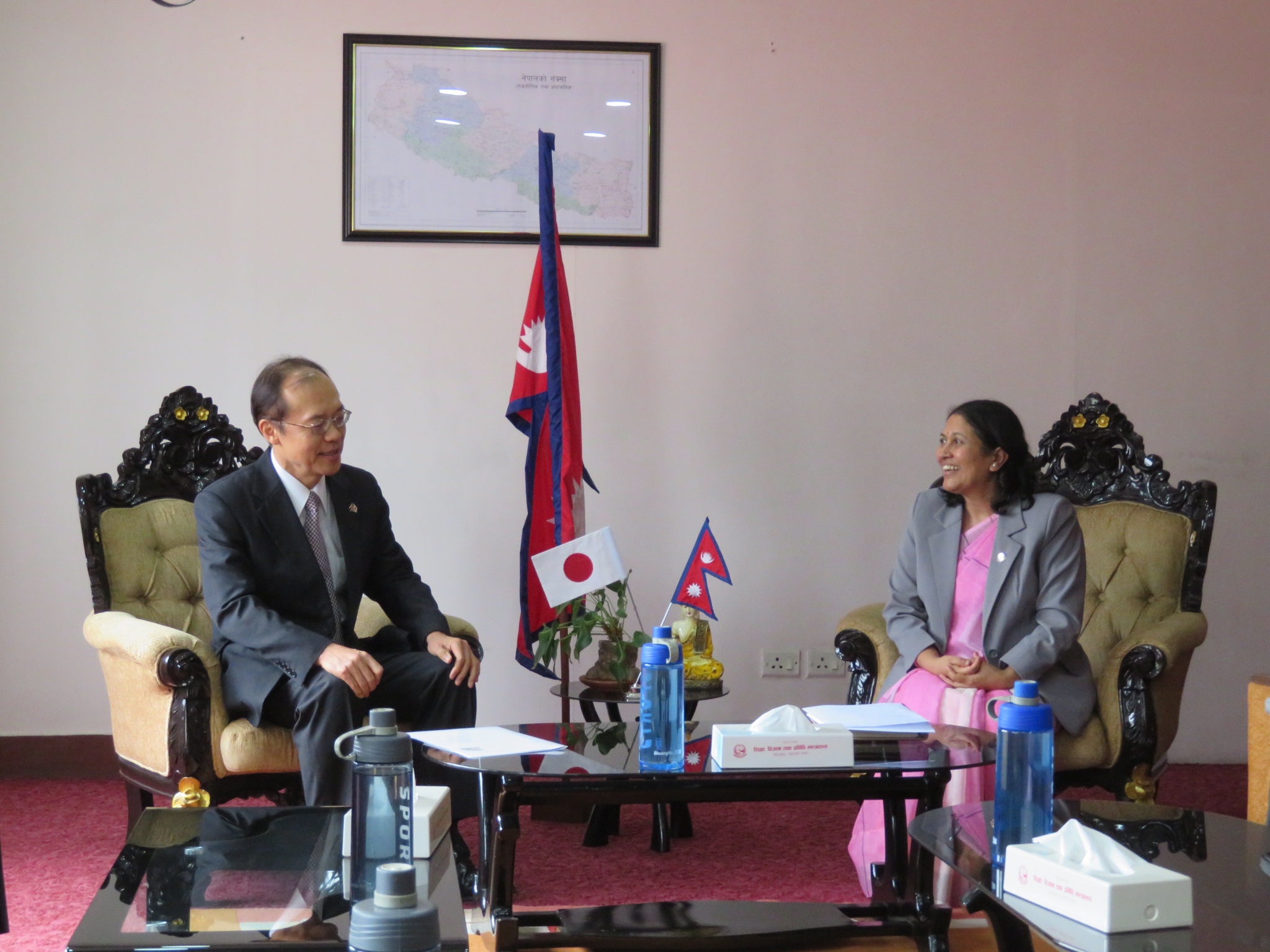
OR

Given the size of the record-large Nepali contingent to Asian Games in Indonesia, the medal tally was solitary silver from participation in 29 out of 40 disciplines
To invoke and paraphrase the timeless adage proclaiming that morning shows the day, the state of sports shows the conditions and content of a democratic nation’s quality of democratic governance. National Sports Council (NSC) officials should be given the marching order and the controversy-ridden but technically recognized Nepal Olympic Committee (NOC) office bearers deserve public reprimand to streamline their wayward ways.
Given the size of the record-large Nepali contingent to Asian Games in Indonesia (Aug 18-Sept 2) and Rs 700 million this poverty-stricken country spared for the lackluster performance, the medal tally was a solitary silver from participation in 29 out of 40 disciplines. From 1951 to 2014, Nepal’s medal standings read lone silver and 22 bronze, eight of them from boxing and taekwondo collected at the 1986 Seoul Games.
Taekwondo coach Deepak Bista attributed the dismal fare to poor preparations and meager investment. Those in the backseat, too, find the assessment obvious. Bista’s conclusion came only after the crushing defeat. Instead of venting his ire so late, he would have done a whale of service by sharing the conclusion prior to Asiad’s latest edition. This way NSC and NOC members might have been jolted into action and done away with their casual, cavalier manner in managing sports as an avenue for position, pelf, liberal expense account and frequent foreign trips.
Score sheet
After the country’s medal drought was ended in a relatively impressive manner during the 1986 Seoul Games, there have been taller talks and bigger budgets from the state coffers while core party activists filled the all-important posts not for any proven credentials, but for political loyalty or, most likely, proximity to political bosses.
Clinging on to the lame and empty argument that participation alone gives athletes valuable exposure is cranky. Theoretically, the best in any sector would also benefit from exposure to international activity of their immediate interest. Little surprise, therefore, that thousands of civil servants make a beeline for multiple trips abroad at the expense of poor taxpayers of this poverty-stricken country of 28 million people.
Sports officials do not even have the courage to own up failure and pledge convincingly to do better with a time-bound public vow. This was not always the case. On the eve of the 1980 Moscow Olympics, when Cold War politics had a pervasive presence also in sports, the United States and most of its close allies boycotted the meet in protest against the Soviet Union’s invasion of landlocked Afghanistan the previous winter.
Nepal, like the rest of South Asia, took part in the quadrennial meet. Western news agencies carried news projecting that the quality of athletes was much to be desired, and hence of substantial rungs below an average Olympiad standard. The press discussed the Moscow meet widely and wildly.
The American news agency, AP, reported that Nepali boxers cowered and confined themselves mostly to the corner of the ring, unable to bear the barrage of punches unleashed in a rapid-fire-like manner by their opponents. The exaggerated description happened to interestingly coincide with the US government’s official policy. After all, a sense of patriotism and selective democracy does not spare even news agencies.
Political leaders like Ganesh Man Singh, on the basis of such reports, expressed shame that our boxers urinated in the boxing ring because of the overwhelming presence and powerful punches of far superior opponents. The Nepali press picked the story to lambast the Surya Bahadur Thapa-led Panchayat government a few months after the 55 versus 45 percent national referendum verdict that spring went in favor of the “party-less Panchayat system with reforms” against the option of “multiparty polity”. The poor boxers were victims of political recriminations at home and the superpower propaganda war invading the sports arena.
At most Asian Games, Olympic Games and professional championships, boxing is a discipline that frequently witnesses knockouts in various weight categories. The highly demanding muscle-stretching, energy-sapping world boxing heavyweight title matches are also prone to recording knockouts.
Cut above rest
Back in 1980, Nepal Boxing Association President Bishnu Gopal Shrestha, then concurrently NSC member and NOC member, in an interview to this scribe sounded very confident of Nepali athletes collecting at least one medal in the Moscow Games. When the boxers came home empty-handed to derisive reactions amid black propaganda involving ideologically warring big powers, Shrestha decided to resign as boxing chief.
Though pressed by his peers not to resign, Shrestha lived up to the pledge announced on the eve of the Games: Either Nepal would win its first Olympic medal or Nepal Boxing Association would get a new president. By today’s standards, his step was exemplary at a time when sports officials have erased words like pain and shame from their dictionary of accountability.
Baikuntha Manandhar beat Jit Bahadur KC in selection trials for participation in the 1976 Montreal Olympics marathon that autumn. KC, who had fetched for Nepal its highest international honors via the 1973 Asian Track and Field Championship marathon, was deeply disappointed when NOC decided to field only one athlete at the Canadian city, in contrast to its earlier announcement that the first two marathoners in the selection trials would be included in the national squad. Lack of funds was NSC’s explanation.
Such last-minute reversal in decision raised questions from the press that it would be better to send a contingent of two athletes without officials. Public mood seemed to side with it. Feeling the brunt of the public and press pressure, the NOC President Khadga Bikram Shah, also King Birendra’s brother-in-law, decided to send only a lone athlete. Hence, as the BBC running commentary of the sporting spectacle’s inaugural ceremony noted, Nepal fielded “the smallest possible” participation, with the lone Manandhar.
At least, royalty’s own had the tenacity to gauge the public mood and respond to it appropriately instead of coaxing the government for more funds and himself leading the squad to Montreal. Would that be realistic to expect from sports officials like NSC General-Secretary Keshav Bista and NOC President Jeevan Ram Shrestha in the loktantrik days?
Neither of them comes anywhere close to another NSC member-secretary and NOC president Sharad Chandra Shaha for a decade starting from 1978. Shaha was arrogant but brimmed with energy and was initiative-prone. His successors today are both arrogant and ignorant. His track record includes being the prime mover behind the introduction of taekwondo and South Asian Games just as National Games and Inter-city Games were his brainchild. And the 1986 Asiad was his crowning glory when it comes to Nepal’s best ever medal standings.
Track ahead
Spotting talents early and offering them timely, regular training with the latest inputs are essential for performances that increasingly demand the ultimate in contemporary athletics. A proper official sports calendar whose schedules, including tourneys, are strictly followed should be introduced. Office bearers who can’t organize regular tournaments annually should be given the sack order. University campuses and higher secondary schools should be targeted for tournaments and training. Inter-city games, introduced in the 1980s, have been abandoned since long. Its revival should prove productive.
Given this scribe’s experience of having watched sports and sports governance from close quarters since four and a half decades, the rot in NSC and NOC should first be cleared. Otherwise, Nepal will not collect any gold for another 50 years, if ever. In fact, this pen-pusher wrote a piece in 1980, which carried the headline “Not in another 50 years”. Nearly 40 years later, the same scribe extends the deadline to another half century. He would, however, welcome, with great relish in being proved wrong, and with it savor the early celebration of an Olympic medal.
You May Like This

MCC Nepal: A Leap toward Prosperity or a Surrender of Sovereignty?
MCC must come with some amendments and the clauses must be written more clearly, respecting the sovereignty and voices of... Read More...

Justice in transition
What about probable international intervention mandated by the United Nations Security Council? The Hague is not the pie in the... Read More...

Revolutionizing agriculture
Nepal aims to achieve a double-digit growth in the next five years. But this won’t be possible without agricultural revolution Read More...











Just In
- Nepal at high risk of Chandipura virus
- Japanese envoy calls on Minister Bhattarai, discusses further enhancing exchange through education between Japan and Nepal
- Heavy rainfall likely in Bagmati and Sudurpaschim provinces
- Bangladesh protest leaders taken from hospital by police
- Challenges Confronting the New Coalition
- NRB introduces cautiously flexible measures to address ongoing slowdown in various economic sectors
- Forced Covid-19 cremations: is it too late for redemption?
- NRB to provide collateral-free loans to foreign employment seekers








Leave A Comment